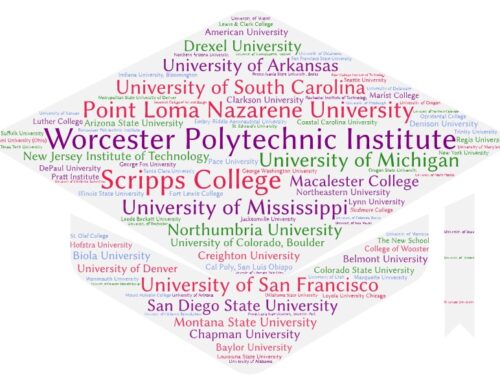In a 6-3 decision announced on June 29, the Supreme Court ruled that the use of race in college admissions (a.k.a. affirmative action) is unconstitutional.
No matter your opinion, the Court’s ruling will impact college applicants, colleges themselves, legacy admissions, financial aid and college essays. This blog post will summarize these impacts.
The Impact on College Applicants
The Supreme Court’s decision may very well cause the student population at highly selective colleges to become less diverse. It may also impact other efforts on campuses nationwide, including Diversity, Equity and Inclusion programs and offices.
For the majority of college bound students, the schools they apply to didn’t consider race to begin with. According to The Chronicle of Higher Education, there are about 3,100 degree granting institutions in the U.S. Of those, only 68 are considered selective, meaning they admit fewer than 25% of applicants. For students hoping to attend one of these elite universities, the Court said, “nothing in this opinion should be construed as prohibiting universities from considering an applicant’s discussion of how race affected his or her life, be it through discrimination, inspiration, or otherwise.” In other words, students may address how race has impacted their life, but colleges can not use this as the sole basis for admission.
The Impact on Colleges
Following the decision, President Biden said colleges should “give serious consideration to the adversities students have overcome, including the financial means of a student or their family; where a student grew up and went to high school; and personal experiences of hardship or discrimination, including racial discrimination, that a student may have faced.”
Some colleges may choose to follow Texas’ example. When the state outlawed affirmative action in admissions in 1996, Texas implemented a rule where the top 10% of students from every graduating class at every high school in the state would automatically be admitted to colleges in the state system. This was thought to level the playing field – students from low and high socioeconomic backgrounds, urban and rural areas, well resourced and struggling high schools would all have to meet the same threshold. However, UT Austin, the state’s flagship university, couldn’t accept that many students, and shortly after the top 10% rule was adopted, the university reduced the percentage of students it automatically admitted from ten to six.
The Chronicle of Higher Education reported, “In the years since they banned race-conscious admissions, California and Michigan have seen dramatic drops in racial diversity among students on their campuses.” Both systems have tried to build racially diverse student bodies through “extensive outreach and major financial investment, well into the hundreds of millions of dollars.” Both university systems say those efforts have all but failed. In amicus briefs filed before the Supreme Court, lawyers for the California and Michigan university systems wrote, “without affirmative action, achieving racial diversity is virtually impossible at highly selective universities.”
Chances are, colleges won’t make too many changes impacting the high school class of 2024, but for students applying to college next fall and beyond, stay tuned.
The Impact on Legacy Admission
On July 3, three Boston-area groups filed a complaint with the U.S. Department of Education, saying legacy admissions at Harvard help students who are overwhelmingly rich and white. Elite colleges often give special consideration to students whose parents are alumni or whose relatives donated large sums of money. According to the New York Times, the groups argued that “fairness was even more imperative after the Supreme Court severely limited race-conscious admissions.” Again, stay tuned to see what, if anything, the Education Department decides to do about this complaint.
The Impact on Financial Aid
While most colleges haven’t said anything in regards to how the Supreme Court ruling will impact racially based scholarships, the University of Missouri system could serve as a guide. On the same day the ruling was issued, Missouri’s attorney general said, “All Missouri programs that make admitting decisions by disfavoring individuals based on race—not just college admissions, but also scholarships, employment, law reviews, etc.—must immediately adopt race-blind standards.” It remains to be seen if other states will follow suit.
The Impact on Essays
While there are as many differing opinions of the ruling as there are points on the political spectrum, there does appear to be one point of agreement: the Supreme Court, President Biden and many others seem to be advocating for colleges to consider how well students have overcome adversity and taken advantage of opportunity. In an opinion piece published by The Chronicle of Higher Education, Rafael Walker, assistant professor of English at Baruch College of the City University of New York, suggested prioritizing resourcefulness: “Given what this person had, what did this person accomplish? Given the access provided, what did this person do with it?”
When students write their college essays, Walker’s ideas may prove helpful. Being able to demonstrate how you have benefitted from all of the opportunities that have come your way and/or how you have overcome different forms of adversity such as socioeconomic status, gender/sexuality, ability, family trauma, and, yes, race will let college admissions officers know who you are as a person. Sadly, the emphasis on “resourcefulness” may make writing about your love of knitting or interest in Aristotle less appealing to students.
Additionally, for students who have experienced trauma, feeling “forced” to write about it in order to obtain admission to college or earn a scholarship may have a negative impact. In Times Higher Education, Anthony Carnevale, director of the Georgetown University Center on Education and the Workforce said, “As someone who won scholarships because I had supposedly shown ‘character’ and overcame adversity, I know what this does to you – it makes you hate the people who are forcing you to say these things. It makes you say how awful your teachers, school or community were – it creates deep resentment, even if you win a scholarship.”
Following the widespread adoption of test-optional admissions, the elimination of affirmative action may make students’ essays all the more important at many colleges. No matter what you choose to write about, remember that colleges use essays to learn more about you than what can be gleaned from your transcript, test scores, extracurriculars and even from letters of recommendation. Your essay doesn’t have to be a sob story; rather, it needs to shine a light on who you are and what you will bring to the campus.
The elimination of affirmative action in college admissions is a huge change. Understanding how this impacts you and the colleges you apply to will be vital.






